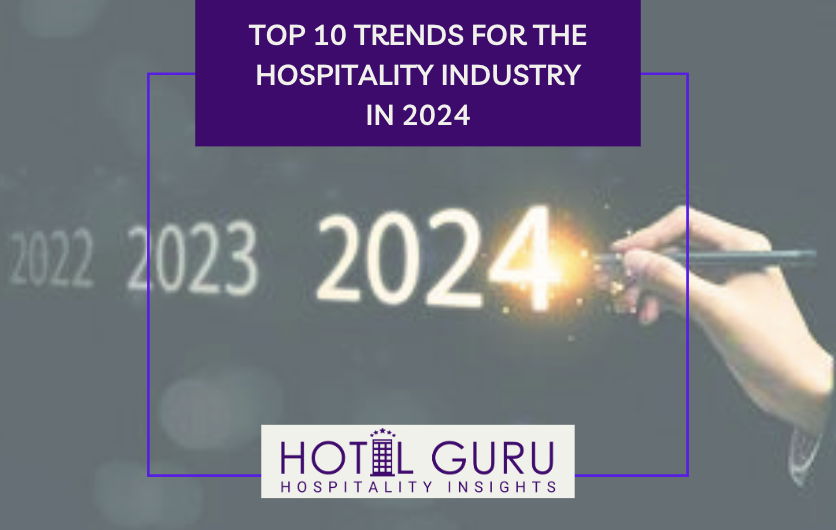Will 2024 Go Up, Down or Sideways for Hoteliers?
This article first appeared on HNN.
US Presidential Election One Big Factor Outside of Industry’s Control
2024 is an election year, but this one is unusual. Both likely presidential hopefuls have such low ratings that more than half the country would like to see them disappear. Most election years have been kind to our industry — 2008 was an exception. So, what is in store for us?
Interest rates will come down albeit slowly; transactions will increase due to lower interest rates and the billions of dollars of hotel debt coming due next year; and the U.S. presidential election will be the most expensive and hotly contested election ever.
Additionally, the remote worker conundrum of a hybrid workweek of three days in the office and two days out might become normal. Will that improve group business? Strong group demand coupled with stronger corporate individual travel would bode well for our industry.
With lower interest rates, it will get very interesting in the transaction market. Remember, many hotel loans will come due in 2025 — preparing for that will consume owners, operators and brands alike.
Revenue Growth
Beginning with revenue drivers, leisure travel seems to have peaked; and business travel has certainly come back but the remote office worker has kept the numbers below 2019. Group business is back, but not quite to 2019 levels; and international business is likely to come back from April to October this year.
Consumer sentiment is getting much better. This year will likely require better technology, powered by artificial intelligence and greater personalization of the guest experience. These require superior knowledge of the data in our hotels, something that many operators ignore.
Operationally, we have a long way to go before our teams are trained well enough to provide personalization. This is a year that those who know their guests’ preferences will win.
Using AI within a property management system, a hotel should be able to provide a list of guest preferences for every single past guest. Certainly, there are team members who can remember what a guest asked for on their last visit to the front desk or the restaurant/bar. But that employee may not be around on arrival of that same guest next week or next month.
Right now, most hotel robots are basic in their skill set, but once they speak to guests in the language the guest prefers, then we have something.
Chatbots are another value-add. They sound human on the telephone. Additionally, AI can assist with more productive scheduling based on peak demand trends — probably better than the guessing that many department heads use to schedule today.
And do not forget energy efficiency. AI can move the needle there, too. Yes, there are cybersecurity concerns. However, this year will be the first big one for AI use in the hotel industry.
Not Your Father’s Guest
Despite improved consumer sentiment, we will need to step up our game. Today’s guests are both more discerning and more cost-conscious. That can be a difficult combination, especially when adding in that many are now Gen Z.
Guests want a spotless room, a fully-enabled entertainment system with multiple viewing choices and an AI component such as Alexa, fitness rooms with more than treadmills and free weights, a restaurant with creative menus and much more. They also have shopped the competition on rates. They want more for less. They got nothing but aggravation during the lockdowns and got gouged — in the opinion of our guests — with high rates during the “revenge travel era.” And they are not necessarily loyal to the same brands.
Owners will have to walk the fine line between guest services and costs — labor costs and supply are major concerns. How does one decide to add a service or not? Does the brand dictate this? Will our marketing include enhanced digital marketing that optimizes SEO, guest experience, paid media and personalization? It must.
This year, money will be tight for renovations, but next year we might have loan defaults or we might have low-interest rates. I am not ready to predict a recession for 2025, but we should be able to avoid one this year.
My bet is for an exciting 2024 with some revenue growth at or above inflation levels, improving consumer sentiment as inflation dissipates, and a crazy election year. May we all pray for peace and revenue growth in 2024!
Hotel Wellness in 2024: What Is It and Who Needs It?
This article first appeared on HNN.
A Buzzword Around Industry for a While Has Just Hit Full Stride
The National Institute of Wellness considers wellness to be “an active process through which people become aware of, and make toward a more successful existence.”
Millions of us serve the hospitality industry every day. Some are in the trenches, back-of-the-house team members who seldom get the recognition they deserve. Others work in the front of the house, sometimes getting recognition, other times getting blamed for a less-than-perfect stay, room, meal or service. Still others are in corporate roles, sales roles, and other facets of hospitality, but we all have one thing in common — stress. Yes, there is stress in our industry. This is where hotel wellness is needed, for both our employees and our guests.
After all, we are open 24/7/365 — 366 days this year! We work all sorts of hours and frankly, while I believe this is a very noble profession, we work hard and are perhaps underappreciated. Guest expectations are high, owner expectations even higher, management is under fire and today’s team members are frequently underprepared for their job responsibilities. The reason for this lack of preparedness is simple: We promoted all up-and-coming stars as soon as the masses disappeared during the lockdowns of 2020.
We all need to take a breath, clear our minds and become more mindful of our fellow team members, guests, relatives and friends.
Who needs wellness?
There is an expression I have never forgotten: “Stop the world, I want to get off.” My mother told me that when I was around 11 years old; and at that time, I decided to adopt the saying, “Everything in moderation.” Well, I probably don’t do anything in moderation, but I do avoid crazy stuff and believe in living life to the fullest. And many of us do the same thing. Either way, the world never stops for us to get off — we must decide when we can get off and literally “take a break.”
I believe there is no time indicator for a “break.” It can be five seconds of deep breathing, five minutes of meditation, five hours of walking, relaxing or just being with friends and loved ones. It can be five days off from work, five weeks of vacation or whatever you’d like. The most important thing is that we must give ourselves a break from stress.
What Types of Vacations or Breaks are Available?
Today’s hospitality industry has begun to focus on just that. IHG Hotels & Resorts has its fitness brand, Even Hotels. Hyatt, Westin, Dream Hotels and Ritz-Carlton all kicked off various hospitality wellness programming, mostly in the past eight to 10 years.
The focus might be on nutrition, relaxation, fitness, yoga, stretching, mindfulness, meditation or more. Sure, it is easier to create a relaxation identity if you are on a beautiful beach, a fitness identity if you have a huge gym with great amenities, and a mindfulness program if you have Deepak Chopra.
We as hoteliers and leaders in the hospitality industry must do two things to improve wellness: Create some of this for our guests and go do it ourselves!
As I write this, I am planning my next two vacations. One will be part adventure, part unplugging, and includes visiting a country I have never been to. The other is both educational and lots of fun and involves drinking lots of wine and learning more about it to add to my sommelier credentials. These planned trips this coming year allow for mindfulness and relaxation, nutritious foods and interesting and new beverages, nice walks and strenuous exercises, and being alone with my wife.
When we plan this type of thing for our guests, it is best to put ourselves in their shoes and improve hospitality. Here are some new wellness programs you can implement at your property:
- Nutritious menu items
- New yoga mats or exercise equipment
- New educational programming
- Food and beverage events
- Spa or relaxation experiences
When we plan for ourselves, we must do something that puts us in a happy place as that will reduce the stress of our return to work. Some will plan a dry January; others will join a gym. Let’s start 2024 with a healthy body and healthy outlook!
Transforming Hotels With Artificial Intelligence
Operators Who Ignore New Tech Will Be at a Severe Competitive Disadvantage
*This article was originally published on Hotel News Now
Scheduling and training processes are becoming streamlined; revenue management has improved optimizations, and SEO and marketing strategies rely on AI to enhance online visibility. Chatbots are used for customer service and exist with many hotel providers today.
Practical Uses of AI in Hospitality
We just revised our menus and wine lists while utilizing AI, and while AI provides insights and depth, it still takes a human to know what is best in a market. This is true with all use cases for AI. It can speed up many processes, support innovation, etc., but there needs to be human knowledge present to question, validate and understand it. Let’s dig into some examples of using AI in hospitality.
Generative AI
As defined by McKinsey and Co., generative AI algorithms can create new content, such as audio, code, images, etc. Commonly reported uses of generative AI tools are in marketing and sales, product and service development, and service operations. Think ChatGPT — you can submit a list of five social media post ideas to promote your hotel. By giving the tool some background into the target market, it can share feedback on your posts, offering the best time to post, which one of the five would be best for engagement, or coming up with a new idea altogether.
The risks of AI include inaccuracy, cybersecurity and intellectual property infringement, according to an April 2023 survey done by McKinsey & Co. Looking specifically at generative AI’s predicted impact on jobs, service operations are the only function in which most survey respondents expect a decrease in workforce size. AI is not a job killer.
Personalization
Improvements in revenue forecasting accuracy alone are significant for hotel revenue management, but there are additional AI use cases that can improve customer relationships.
AI can improve digital marketing by enhancing customer personalization, generating better content — through tools such as ChatGPT — and tracking user journeys from website to website and click to click. Adding a chatbot provides information to potential guests and can encourage more guest bookings and create conversations.
One risk of chatbot use is frustration if a guest asks a question and the content does not exist on the website. The hotel must ensure that websites have comprehensive and correct information. Another potential drawback of a chatbot is AI hallucinations, which is when the chatbot provides false information.
Energy and Sustainability in Hotels
AI can optimize energy efficiency and sustainability by adjusting thermostats in guestrooms and adapting lighting and artwork to craft a bespoke environment.
For example, the Nest Thermostat is designed to learn the timing of heating and cooling, allowing the room to become more energy efficient.
The goal is for AI to improve hotel operations and streamline workflows, allowing human staff to attend to other essential tasks. One example is using robots to take extra towels, toothpaste, or food and beverages to guestrooms. Hotels should learn to love robot technology in 2024.
Innovation in Hospitality
As artificial intelligence continues to gain traction, it will be essential to remember that while there are plenty of unknowns, there are myriad opportunities to harness its power. MMGY expects AI to play a more prominent role in the following key areas of hospitality:
- Expanding creative concepting capabilities.
- Cross-channel campaign optimizations.
- Data analysis, insights and measurement.
Currently, revenue-management systems use data analysis to optimize pricing strategies based on demand and competitor pricing. New AI technology for revenue management should be used to price packages and personalize offers based on user preferences.
Technology can also be utilized for hiring and training. Automated recruiting tools use AI to find applicants and chatbots can screen applicants. After hiring, e-learning platforms support employee training and development.
Cybersecurity
Ransomware attacks against significant hospitality companies have already occurred, and we will likely see a new focus on cybersecurity in 2024. Training staff must be a critical focus of hospitality in the future.
AI can improve the way hotels manage day-to-day operations. By deciphering patterns and predicting demand, AI enables hotels to optimize staff schedules and efficiently manage resources. This translates to a smoother, more compelling experience for guests. From trip planning to digital concierge to luggage storage on check-out, AI is changing the hospitality industry.
While we are still behind other industries, we are striking the balance between art and science.
Insights into the Hotel Industry: A Conversation with Bob Rauch
In the interview with Gary London, Bob Rauch discusses various aspects of the hotel industry in 2024, particularly focusing on the United States and Southern California, with an emphasis on San Diego. Listen as we dive into the resilience of the hotel market, technology improvements, and labor challenges within the industry.
Resilience of the Hotel Market:
Despite facing challenges such as 9/11, the Great Recession, and the COVID-19 pandemic, the hotel market has stayed resilient, with periods of strong growth interspersed between downturns. San Diego, in particular, has managed to capture markets even during weaker periods due to its coastal location and strong visitor appeal.
Impact of Technology in the Hotel Industry:
Technology, particularly artificial intelligence (AI) and robotics, has played a significant role in the hotel sector. For example, the implementation of service robots for tasks like delivering towels and food items to guests, as well as using AI for revenue management and guest communication. Technology is a key driver for enhancing guest experiences and operational efficiency.
Labor Challenges in Hospitality:
Labor-related issues consistently pose challenges in the hotel industry. From managing diverse employee needs and conflicts to ensuring guest satisfaction through empowered staff, labor remains a critical aspect of hotel operations. Technology adoption, including robotics, can mitigate some labor-related challenges but also underscores the importance of well-managed human resources.
The interplay between technology, labor management, and market resilience is shaping the industry’s trajectory, with a specific focus on San Diego’s hotel landscape.
Hospitality professionals should continuously adapt and adjust strategies based on market conditions and changing consumer preferences. If you enjoy content like this, subscribe to Hospitality Innsights to stay up to date.
Top 10 Trends for the Hospitality Industry in 2024
The hospitality industry transformed in 2023, driven by technological advancements and evolving guest demands. We’ll explore the ten emerging trends for 2024 in the hospitality industry.
Artificial Intelligence
AI in the hospitality industry will enhance revenue management, menu development, employee and guest education, marketing, sales and more. We are at the very beginning of this exciting technology, and yes, there are some cautions ahead.
Wellness, Fitness, and Diet
Hotel properties that expand fitness centers, personalize spa treatments, and craft healthy food and beverage menus will rule. While luxury travelers have already been seeking wellness, a basic hotel gym with simple exercise equipment is not going to be acceptable to the masses either. Consider wellness offerings like aromatherapy, mindfulness classes, daily yoga, and Pickleball – the fastest-growing sport in America.
Personalized Service
Hotels have an opportunity to offer personalized interactions beginning with the day a potential guest visits our websites, and extending long after a guest leaves our properties. When it comes to in-person experiences, guests want to be treated as special when they pay top-dollar. Consider leaving a chilled bottle of bubbly in their room on their anniversary or help them discover experiences that align with their interests.
Training
Hoteliers, it’s time to focus on talent as a major trend this year. Generation Z will require competitive pay, extensive training, and flexibility. The metaverse is reshaping the employee and guest experience. Airlines, hotels, restaurants, and more travel providers are leveraging this platform for employee onboarding and training. Hilton Worldwide was among the first hospitality brands to embrace the metaverse to develop a virtual training program, which is particularly effective when it comes to younger employees, who tend to prefer digital learning and gamification.
Robotics
Embrace robots in hotels to help with customized service, staff support, and continued guest loyalty. They can vacuum, quickly deliver room service directly to the guest room, and provide concierge services. The global market for hotel robots is expected to grow from $79 million in 2020 to $338 million by 2025, at a compound annual growth rate of 32.8 percent, according to a report by MarketsandMarkets.
Chinese Travelers
Chinese travel to the US will increase dramatically as China was the last of our strong markets to return to outbound travel due to COVID-19. Research by MMGY shows a strong intent to travel and the Chinese government is relaxing rules around visa renewals (shortening the wait times for new visas). Expect strong growth in this sector, perhaps close to 20%.
Diversity, Equity, and Inclusion (DEI)
DEI is now mandatory training for most companies. More women will be presenters and panelists at conferences and will have more responsibility in their positions. Women in Tourism and Hospitality are making a big hit and diversity is the driving force. People of color are being hired more frequently and are rising in the ranks more quickly. Take a look around you—it is already happening!
Sustainability
Environmentally conscious travel is a key concern of 76% of global travelers, according to the American Hotel & Lodging Association (AH&LA). Hoteliers are trying to reduce their properties’ carbon footprints and AH&LA just launched the Green Key Global certification program. There are expectations that hotels have programs that reduce waste and energy consumption, use eco-friendly materials, follow environmentally sensitive practices, and support local communities. Showcasing this on your website is critical today.
Debt
Debt is expensivefor new construction or acquisitions which makes the math difficult for developers and buyers. Most debt is priced in the 8% range with 60%-70% loan-to-value. The Commercial Mortgage-Backed Securities market appears to be picking up momentum for five-year fixed-rate debt, slightly lower than the 8% range. Hotel construction will likely include a mixed-use component to integrate spaces that cater to the multiple needs of an urban mixed-use development. These may include residences, wellness hubs, serviced offices, and private member clubs.
Remote Workers
Remote-work flexibility is also an overall benefit to the travel and hospitality industry, according to Tourism Economics. The number of days worked from home grew from 5% before the lockdowns to 28%, more than 1 in 4 days. Thirty-four percent of leisure travelers said they plan to travel while they work remotely. Airbnb has said its guests are extending typical weekend stays a night or two over the shoulder days.
In addition to the 10 hospitality trends mentioned above, The Federal Government plans to improve the overall air travel experience through the Federal Aviation Administration reauthorization bill, lower U.S. visitor visa interview wait times, and reduce Customs wait times at U.S. airports and ports of entry. This is being done by other countries already. These trends are either on the horizon for 2024 or are already underway. Wishing you a fantastic 2024 with no recession in sight!
Six Traits for Success as a Hospitality Entrepreneur
Planning, Creativity, Collaboration Among Them
By Robert Rauch
December 5, 2023 | 5:59 AM | This article first appeared on HNN.
Many young potential hoteliers have asked me what it takes to be an entrepreneur in this great and noble industry.
Some are my students — I teach Entrepreneurship at Arizona State University — and others I meet at industry gatherings or are rising employees at our hotels.
Here are the six traits for success that I often discuss with them.
Lifelong Learning
I can’t recall the last time I felt I had learned enough and didn’t need further education. Although I don’t attend every conference session presently, I read new content daily, attend conferences, stay involved in all local hospitality associations where we operate, and use my teaching, writing and speaking engagements to continue growing.
I firmly believe that staying actively engaged like this leads to a bright hospitality future. If one aspires to be their own boss, these are key principles of success. Additionally, asking questions and being prepared to take risks is essential.
Business Planning
Whether you’re already in business for yourself or considering it, having a simple business plan outlining short-term and long-term goals is crucial. A well-thought-out plan for each day and a roadmap for growth increase the likelihood of success. Business plans need not be highly academic; a set of action plans suffice.
For those seeking capital, more sophisticated approaches outlining all business risks and strategies to capture market share are necessary. A detailed budget is critical when seeking capital.
Tech Comfort
You don’t need to be the on-call IT person at your company. However, if you’re unwilling to learn about websites and their content, engage in social media or use technology without help, your future prospects will be severely limited.
Becoming tech-savvy enables you to compete, even if you’re not a Gen Zer or millennial! Embracing technology allows you to keep pace with artificial intelligence, robotics and the Internet of Things.
High Activity
Differentiation of your product is crucial to gaining market share in both the hotel and vendor sides of hospitality.
Michael Porter, whom I consider the Dean of Competitive Advantage, always stressed the importance of a long-lasting competitive advantage. Price is good for a day, but a true advantage endures because it can’t be quickly replicated. Be proactive and view adversity as a challenge to progress.
Creativity and Collaboration
Visualization is as effective in business as it is in sports. Whether preparing a speech, game-planning for a sports event or launching a business, creativity can make all the difference.
Visualizing the future can stimulate, energize and provide enthusiasm for your project, whatever it might be. A creative imagination might even surpass the knowledge others have gained.
As Einstein once said, “Imagination is more important than knowledge.” Collaborate with others — seek counsel and build a trustworthy team.
Financial Acumen
You don’t need to be a CPA to succeed, but every entrepreneur requires a keen awareness of finance. Cash is king, details matter, and every penny must be accounted for — otherwise, a great marketing plan and operational execution can be wasted. Clean month-end closes, prompt review of profit-and-loss statements and careful examination of every financial document are immensely helpful.
A successful entrepreneur drives towards their goal while disregarding doubters. Make the plan, execute it and have a fantastic holiday season and a successful 2024!
Robert A. Rauch is founder of R.A. Rauch & Associates, a hospitality management and consulting firm based in San Diego.
What To Expect and What Can Go Wrong for Hoteliers in 2024
Challenges Abound, But American Mindset Remains ‘Travel Is a Birthright’
By Robert Rauch
HNN columnist – Original article can be found HERE
U.S. hotel occupancy has been flat for the past 90 days, but average daily rate has already surpassed 2019 levels.
New hotel supply is muted due to high-interest rates and high construction costs, which has provided some tailwinds. We expect revenue per available room to be up 5% in 2024, driven by stable leisure travel, stronger business, group and international travel, and the continuation of the American mindset that “travel is a birthright.”
Capitalization rates will likely increase somewhat in 2024 as there will be many loans and property improvement plans coming due, increasing some pressure on owners with those loans that are at 4% to 5% now. Interest rates are at 7% to 8%.
Wage increases are 20% above 2019, and average rates, albeit up from 2019 by double digits, cannot keep pace. Additionally, insurance and energy costs are up markedly. Consumers have dollars to spend, but in some markets, it’s likely that short-term rentals will continue stealing some market share from hotels. Also expect U.S. citizens to fly off to Europe through most of 2024.
Questions include: How high will oil prices get? Will there be layoffs and unemployment?
Delinquency on loans has picked up and trillions of dollars of debt will mature by 2025. That said, there is private equity ready to jump in. Household debt is high and not sustainable, but the job market should keep it up through what will likely be a soft landing, not a recession.
We expect a modest pullback in spending through the second quarter of 2024 and then a strong rebound in the third and fourth quarters. Inflation should calm down to 2.6% in 2024, according to Bernard Baumohl of the Economic Outlook Group.
What Can Go Wrong?
What might go wrong with hotel revenue growth? To summarize from Baumohl’s Lodging Conference presentation, the Federal Reserve moves rates up, the economy stumbles, a banking crisis arises, and financial stress is put on our entire industry. The 2024 U.S. presidential campaign could create social unrest and/or violence and new COVID-19 strains might spread quickly and dodge immune systems. Additionally, there are foreign risks, the Russia-Ukraine war could expand, China may push harder to annex Taiwan, and a catastrophic cyber warfare event is possible according to 93% of cybersecurity experts.
The bottom line is that the hotel industry still faces headwinds. Accommodation employment remains 250,000 positions below the pre-pandemic level as of June. Attracting new workers can be costly, and the reduced headcounts have led to strong wage growth for leisure and hospitality workers, which has ultimately affected the bottom line. Operating expenses have also increased due to inflation in other areas, including food, energy and insurance costs.
The hospitality industry is undergoing tremendous innovation driven by artificial intelligence. Hotels are expanding their offerings, particularly in the luxury space as the lines between work, life and play have blurred and the world’s population continues to grow. These include private-membership clubs, yachts and branded residences. Hotels have also embraced technology to streamline workflow and enhance the guest experience, leveraging digital platforms and a range of innovative solutions including virtual tours, self-service kiosks, predictive analytics and AI-powered chatbots.
Renovation and construction costs are up significantly. Lead times on furniture, fixtures and equipment are within 10% of pre-pandemic levels, so the supply chain has become less congested, with items that might have taken 12 weeks pre-pandemic now taking 14 weeks, a major improvement from a year ago. But pricing has stabilized at around 15% higher than pre-pandemic levels, so renovation costs are still significantly higher compared to 2019. The cost of labor and construction materials also have skyrocketed.
CoStar’s Jan Freitag stated: “In terms of normalization … the way I think about it is that the outperforming markets are normalizing back to growth rates that are normal because they were overindexed — and underperforming markets are also coming back to normal because their growth rates are not going to be that bad forever.” Every market will experience different dynamics.
To a great fourth quarter that leads to an even better 2024!
Robert A. Rauch is founder of R.A. Rauch & Associates, a hospitality management and consulting firm based in San Diego.
Why Hotels Should Learn to Love Robot Technology

The guest experience is getting upgraded at many hotels today thanks to innovative robot technology.
Aloft Hotels first introduced the world’s first robotic concierge in the early 2000s, and in 2014, they brought Botlr, a robot butler service, to the team. These AI enhancements increased the guest experience through shorter wait times for room deliveries and improved housekeeping operations efficiency. Aloft may have led the way, but other hotel chains are quickly catching on to the advantages of robotic services.
Some challenges could offset these advantages due to the costs of implementing and maintaining the robotic infrastructure and a lack of industry-wide standards for hotel robots. Yet, as hotels face a growing demand for services amidst a shortage of workers, they are likely to increasingly turn to robotics for solutions. Experts predict the global market for hotel robots will grow to $338 million by 2025.
Robert Rauch, hotel entrepreneur, Managing Partner, Hilton Campus Del Mar, faculty associate at the School of Community Resources & Development at Arizona State University, and CEO of RAR Hospitality, see the efficiency benefits of bringing robotics to both front- and back-of-house hotel operations as multi-layered. Beyond that, though, Rauch sees the investment as a smart move for increasing hotel profit margins in 2024.
Robert’s Thoughts on Robot technology in Hotels
“I’ve got to tell you, robotics is the future. We have two types of robots. One is a service robot, the other is a vacuuming robot. So the service robot we’ve had for six years now, and I can tell you the guests see the service robot at the front desk. By the time they’re up in their room asking for either food, beverage, or supplies, they ask for the robot.
Now, is it because they don’t have to leave a tip? No. Really, they are just wowed by interacting with the robot. So what else does the robot do? If you have an 11:00 PM to 7:00 AM shift where you have one employee in the hotel, because it’s a limited service hotel, you’ve got better security because the delivery’s made by the robot. Also, you’ll be able to tell if the WiFi system is not working because it works on the WiFi system, so it’ll tell you if there’s a problem, and it also has a camera and sees any security issue in the hotel. So, highly recommend getting a service robot.
Relative to vacuuming robots, while we’ve only had them for about six or seven months now, I can tell you that it reduces pressure on the housekeeper’s backs and also creates a productive environment where the housekeeper’s cleaning the bathroom while the robot is vacuuming the floor in the bedroom. So, why get involved? Great PR, your guests will love it, your employees will love it, and it’ll help your productivity.”
A Chapter Book to Hotel Planning
Step-by-Step Guide to Hotel Business Plans
By Robert Rauch
HNN columnist – Original article can be found HERE
September 26, 2023 | 5:35 AM
Today, there are two critical elements that must be planned and executed by every hotelier; the business plan and the budget. A short summary up front will save the Type A reader from heartache, and six short chapters with a concluding chapter on what steps are needed is very helpful.
The first chapter is a current status or forecast of trends as well as a competitive analysis that shows how we stack up against the hotels in our STR competitive set. I attended the Lodging Conference to listen to Bernie Baumohl of the Economic Outlook Group, a great presenter and forecaster of macroeconomics. I also like to have a graphic that lists how we compete in various areas like location, brand, reputation, amenity package and so forth. I call it our beauty contest.
The second chapter includes fiscal risks as well as operational risks. If we are unable to pay for a needed renovation or if we are having difficulty finding employees, that information is critical for the owner. Anything that puts the hotel at a competitive disadvantage should be discussed here, not just competitive advantages.
Chapter three is a review of the geographic location including transportation and neighborhood demographics that include our intended target market. Using data from the local tourism authority or chamber of commerce assists us as will an analysis of our market segmentation. Today, we have seen shifts in business and group travel as well as domestic leisure and international travel.
Chapter four identifies the key management personnel. An overall organizational chart that includes all salaried executives and key leadership is appropriate. Adding the key responsibility parameters for each of them is very helpful for the reader and ensures that all are on the same page. Further, we are all finding lots of need for training new management team members who were line employees last year.
As we increasingly provide guests with an authentic connection to our area, a well-configured hotel revenue/sales system can help us optimize these strategies and boost revenue. A lead form at the front desk, and reviewing competitor websites/social sites — including Instagram, Facebook and Twitter — is critical. Looking at all previous users of our property, strengthening community relationships and exploring creative partnership opportunities work wonders.
Chapter five is a market analysis that identifies all direct and indirect competitors along with a summary of each and a brief summary of how we will compete and position our hotel with each. Develop a demand projection based on an estimate provided by a local guru from a tourism authority or consulting firm, or if you prefer, go with your gut after completing the work below.
Review market intelligence reports carefully. Ensure email lists are updated for newsletters and e-blasts and meet with general managers and marketing team members of competitor hotels. Site tour each business and establish a referral program. Coordinate a market review with the revenue management team and discuss opportunities for digital marketing and pay-per-click.
Additionally, meeting with key contacts at the brand, visitor bureau and chambers of commerce is worth the time. Qualify key companies and individuals to create or update email lists. Business Journals also have great lists of top businesses and employers. Continuously create and deliver “can’t-resist” content for websites and e-blasts. Post to social media at least two times per week, and use public relations effectively by having a PR plan and a clear sales action plan with whom, what, when and how much does it cost?
Chapter six morphs into the budget, which should be commenced only after we know what the draft business plan looks like. This financial analysis must include all needed capital expenses as well as operating expenses for each department. Remember that inflation has moved energy, insurance, food and labor costs up significantly over the past 18 months. Supply costs are up, and if revenues will not be sufficient to pay these expenses, here is where big decisions must be made. Budget accuracy depends on the determination made to gather correct and current market data, so research is paramount!
Chapter seven is our summary of how we will perform and why. It behooves all of us to do this work prior to the budget, though many hotel executives will continue to use a plugged budget number from last year’s profit and loss statements. Be honest about the hotel’s strengths and weaknesses and we will nail our budgets!
2024 will see increased use of big data, robotics and artificial intelligence. Stay up on the latest and we will all love 2024, an election year!
Robert A. Rauch is founder of R.A. Rauch & Associates, a hospitality management and consulting firm based in San Diego.
The ‘Secret Sauce’ for Hotel Food and Beverage
Tips for Hiring, Training and Serving Up Memorable Experiences
By Robert Rauch
See original article posted on CoStar HERE
The hospitality industry runs on creating memorable guest experiences.
If not, it becomes a business with no differentiation, merely selling commodities. It is paramount that hoteliers go above and beyond for our guests, and the best way to do it is to truly differentiate from our competitive set by doing something bespoke.
Food and beverage scare most hoteliers in the focused-service sector, so go for it! Exceed guest expectations with a combination of creativity with food and beverage and smart hiring. The creative food and beverage might include education, wellness, nutrition or just plain cool drinks and good food. Smart hiring makes all the difference!
Hiring Based on Attitude
Skills are not that important. Rather, a positive attitude, a sales mindset, tech-savviness and financial accountability often outweigh specific skill sets. Ultimately, it is the “attitude” that makes all the difference.
We recognize the value of team members who are passionate about delivering exceptional service. In addition, we want these team members to align with our organizational culture and values. By prioritizing attitude in our hiring process, we can cultivate a motivated and engaged team that consistently delivers for our guests.
Today, it is much more difficult to find the right person. We have found that we were perhaps too focused on experience and not focused enough on the person.
Valuing Guest Reviews
As an owner, I personally read every review of our hotels and particularly the reviews of our restaurants. Reviews provide valuable insights into guest perspectives, highlighting areas for improvement. These reviews are an essential source of feedback that we must not overlook.
By actively listening to our guests and taking their feedback to heart, we can continuously refine our offerings and enhance the guest experience. Responding to reviews, both positive and negative, demonstrates our commitment to guest satisfaction and encourages open communication.
Learning Through Training
By investing in employee training, we ensure that they appreciate the importance of delivering excellent service. Continuous skill and knowledge development empower our team to provide exceptional guest experiences. Focusing on key areas and excelling in them can have a significant impact on our guests.
Treating every individual as a VIP is a winning strategy as it fosters a great service culture and assists in our employees’ growth. We equip them with the tools and knowledge to create memorable moments for our guests and fully support them.
Food and Beverage
The “typical hotel restaurant” is more in line with today’s guest expectations. However, some hotels offer unique and much more enticing food and beverage experiences.
What are guests looking for? Well, health may not be the first thing on their minds, but when every choice is grease-laden, fat-laden and unhealthy, it is not acceptable to many guests. Some guests have high cholesterol and really do watch what they eat. Others are just plain health-conscious and want healthy meal options in conjunction with those healthy lifestyles.
Hotels that recognize a paradigm shift in customer preferences will outperform those that do not. Plant-based and vegan options have gained popularity over the past few years. Further, a sustainable environment and locally sourced ingredients continue to be a priority for some travelers.
Others have embraced mocktails as they either do not drink alcohol or have opted for a period of abstaining. Craft beverages are trending in the hospitality industry — from specialty cocktails to local beers and wines, our hotels are now adding education to the lineup. As an example, we recently hosted both a beer tasting and a wine tasting. The beer was from a local brewery and featured ales, lagers, stouts and more. The wine tasting was hosted by yours truly, fresh out of sommelier training. It was a blast and the guests loved learning about multiple varietals and drinking really good wine — no charge for loyalty members was really popular. The cost was my time as the wines were gifted by our suppliers.
Cheers to a great fourth quarter with no recession, no major tragedies, and lots of happy employees and guests!
Robert A. Rauch is founder of R.A. Rauch & Associates, a hospitality management and consulting firm based in San Diego.














